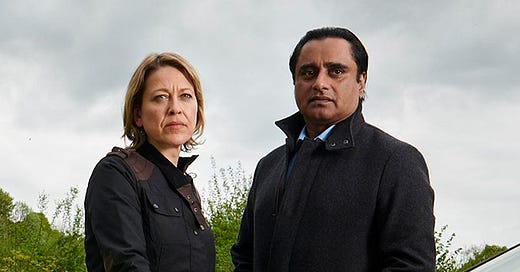I admit to binging on the last season of the BBC crime show, Unforgotten. I’ve watched all four seasons because I was drawn into its unique perspective with the first season three years ago. The series is about a cop in London whose forté is discovering the killers of individuals long dead. The theme is that the families have not forgotten their missing children, or other family members missing, after 20 or 30 years. It is a relief for them to know, finally, what happened to their relative.
Central to this drama is DCI Cassie Stuart. Stuart is the typical, successful cop: she is driven to find out what happened and who made it happen. No other type of personality could do this job. There’s a glitch, however. Cassie is distracted by long term issues within her own family. Secondly, the job, after 29 years, is wearing down on her soul.
I don’t know how any cop can keep at it for such a long period of time. Think of the human tragedies they confront day in and day out. Writer and former detective, Joseph Wambaugh, of the Los Angeles Police Department, referred to them as blue knights. Except that knights didn’t fight wars every day for 30 years. There were no drunk drivers, murder was rare, plus his lordship, and tradition, protected the people in the village from crimes like theft and rape. The penalties for getting caught were severe. If one wanted to be a criminal, best take to the road, or high seas, to engage in nefarious activities on a large scale.
We ask more of our cops, and yet tie their hands, to control them. It is a tricky situation, our modern police find themselves in. Especially the street cops. Not so for the detectives. Detectives also have their hands tied by our Bill of Rights, but they also have technology to give them an assist. That end of detective work has grown at a pace not even Sir Author Conan Doyle could have predicted. It is that technology that is the reason DCI Stuart can find a murderer after the case has gone cold for decades.
The mythology here is Sherlock Holmes. Doyle, when he wrote this archetype detective, made him smart but not impervious to his lifestyle and its effects on the human spirit. Priests, who also deal with the tragedies of life, also take part in the great celebrations of birth and marriage, and natural deaths. Their lives are balanced out. Cops have to live in the sewers, and deal with the shit. After a bit, they are schooled about humanity. So their figuring out who is a bad actor, becomes second nature. Like Holmes, they learn to look at the details that the rest of us overlook.
When overloaded, Holmes turned to his violin as a lure away from his thoughts. It helped him to think indirectly by giving his mind a rest. It is a technique used by creative people, to distract the mind with something foreign to the problem at hand, so that the mind can sort it out, subconsciously.
Cassie Stuart is too distracted by her problems at home. You can see it build up in each of the seasons, and in the last season, this familial distraction becomes annoying to the point where one wants to slap her, to tell her to snap out of it. To let it go.
Of course, she figures out who the perps are in this thirty year old cold case. In investigating the case, she learns the possible suspects were five, newly graduated, future cops. Three of whom are still cops. Well, that strikes close to her other home. Her cop family. Unlike her second son, who remains at home, with the cop family she has the authority to act.
As for her family problems, Cassie lacks authority. She cannot walk away from what she cannot change.
Cassie never learned the serenity prayer. And, in the end, she didn’t live to see the solution to the case fully revealed. But it isn’t a perp that does her in. She does that job all on her own. Cassie dies from the results of a traffic accident she caused. She is T-boned in an intersection when she is so distracted, she doesn’t see the red light.
That red light, for Cassie, had been there for a very long time. Sure, her life was complicated, but like any of us, we invite those complications in when we think we can control others.
Our archetype, Sherlock Holmes, did understand that one cannot control situations. His success was allowing himself to say no to certain people, and to pick up the violin and play.
Cassie needed a violin. But then she would have to actually pick it up to play it. Like Prometheus, Cassie gave the fire of knowledge to families, which gave them relief. For Cassie, even if a Herakles could come along to rescue her, she would still have to decide, to let go.




